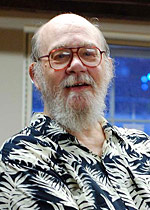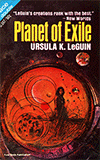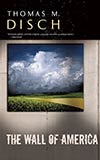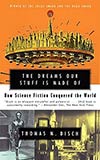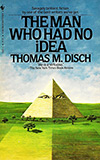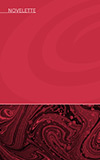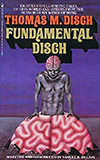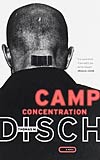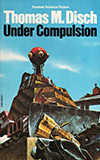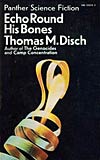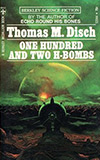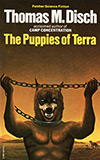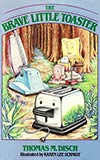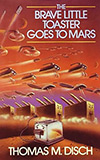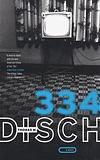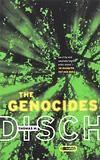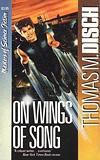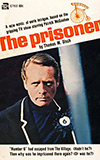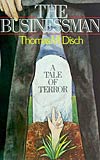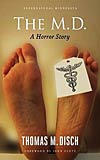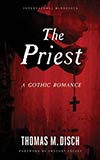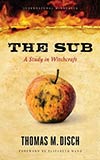Thomas M. Disch
| Full Name: |
Thomas
Michael
Disch |
| Born: |
February 2, 1940
Des Moines, Iowa, USA |
| Died: |
July 4, 2008
New York City, New York, USA |
| Occupation: |
Writer, Poet |
| Nationality: |
American |
| Links: |
|
Biography
Disch was born in Des Moines, Iowa, on 2 February 1940. Because of a polio epidemic in 1946, his mother Helen home-schooled him for a year. As a result, he skipped from kindergarten to second grade. Disch's first formal education happened at Catholic schools; this experience shows itself in parts of his work, which contain scathing criticisms of the Catholic Church. The family moved in 1953 to the Twin Cities in Minnesota, rejoining both pairs of grandparents. In Minneapolis public schools, Disch discovered his long-term loves of science fiction, drama, and poetry. He describes poetry as his stepping-stone to the literary world. A teacher, Jeannette Cochran, assigned 100 lines of poetry to be memorized. Disch wound up memorizing ten times as much. His early fascination continued to influence his work with poetic form and the direction of his criticism.
After graduating from high school in 1957, he worked a summer job as a trainee steel draftsman - just one of the many jobs on his path to becoming a writer. Saving enough to move to New York City, he found a Manhattan apartment and began to cast his energies in many directions. He worked as a (literal) spear-carrier for the Metropolitan Opera, then at a bookstore, then for a newspaper. Just when he seemed to be getting work closer to his love of language, he turned 18 and enlisted in the army. Disch's incompatibility with the armed forces quickly resulted in a nearly three-month commitment to a mental hospital. After his discharge, he returned to New York and continued to pursue the arts in his own indirect way: a job in a theater cloakroom that let him peer in on Broadway. Eventually, he got another job with an insurance company and went to school. A brief flirtation with architecture school led him to night school at New York University, where classes on novella writing and utopian fiction developed his tastes for some of the common forms and topics of science fiction. In May 1962, he decided to write a short story instead of study for his midterms. He sold the story, The Double Timer, for $112.50 Having begun his literary career, he did not return to NYU but rather took another series of odd jobs such as bank teller, mortuary assistant, and copy editor - all of which served to fuel what he referred to as his night-time "writing habit". Over the next few years he wrote more science fiction stories, but also branched out into poetry; his first published poem, "Echo and Narcissus", appeared in the Minnesota Review's Summer 1964 issue.
Writing had become the dominant focus of his life. Disch described his personal transformation from dilettante to "someone who knows what he wants to do and is so busy doing it that he doesn't have much time for anything else." Several books followed, including science fiction novels and stories, gothic works, criticism, plays, a libretto for an opera of Frankenstein, prose and verse children's books such as A Child's Garden of Grammar, and ten poetry collections. His poetry includes experiments within traditional forms, such as a collaborative sonnet cycle Highway Sandwiches and Haikus of an AmPart, while others like The Dark Old House mix stricter and freer form. Like other popular American poets, he often uses humor and irony to power his poems. His two major books of poetry criticism, The Castle of Indolence: On Poetry, Poets, and Poetasters and The Castle of Perseverance: Job Opportunities in Contemporary Poetry focus on what makes poetry work, what makes it popular, and how poetry can re-establish a place in modern popular culture. His writing includes substantial freelance work, such as regular book and theater reviews for The Nation, The Weekly Standard, Harper's, The Washington Post, The Los Angeles Times, and Entertainment Weekly. Recognition from his award-winning books led to a year as "artist-in-residence" at William and Mary College.
His last published work, the posthumous story collection The Wall of America, contains material from last half of Disch's career.
He maintained an apartment in New York City, sharing it and a house in Barryville, New York, with his partner of three decades, poet Charles Naylor. After Naylor's death in 2005, Disch had to abandon the house, and he became steadily more depressed. He wrote on a LiveJournal account from April 2006 until his death, in which he posted poetry and journal entries.
Thomas Disch traveled what now seems like a traditional American path: he spent the 1940s and 1950s growing up in the Midwest, and then he tore away to the Big City as a young adult, entering the 1960s with hungry experimentalism and precocious glee. Disch was widely traveled and lived in England, Spain, Rome, and Mexico. In spite of this, he remained a New Yorker for the last twenty years of his life. He said that "a city like New York, to my mind, is the whole world." During his 60s, partially disabled and relying on a cane, he seldom left his long-time New York City residence overlooking Union Square.
As mentioned, Disch's New York began with a string of blue-collar jobs, working full-time while attending college. While he worked those jobs, he was trying his best to leave behind the influence of his father, a traveling salesman; he dipped into a wide variety of jobs - almost anything that would keep him afloat - while he investigated his many interests. Some of these jobs paid off later - doing grunt-work in New York theater culture allowed him to both pursue his life-long love of drama and led to work as a magazine theater critic. Before his critical and non-fiction work, however, he started with short stories, poetry, and eventually novels.
His first published poems, though reaching print later (the first in 1964, though not collected until 1972), were written alongside the stories and novels which made his name in the 1960s. Although he aimed his poetry at a different readership than his fiction — even simplifying his by-line from Thomas M. Disch to Tom Disch — both genres emerged from the same expanding mind and changing times. Disch entered the field of science fiction at a turning point, as the pulp adventure stories of its older style began to be challenged by a more serious, adult, and often darker style. This movement, called "New Wave", tried to show that the ideas and themes of science fiction could be developed past the simple desires of an audience of twelve-year-olds. Rather than trying to compete with mainstream writers on the New York literary scene, Disch plunged into the emerging genre of science fiction, and began to work to liberate it from some of its strict formula and narrow conventions. Much of his more literary science fiction was first published in English author Michael Moorcock's New Wave magazine, New Worlds.
During his long and varied career, Disch found his way into other forms and genres. As a fiction writer and a poet, Disch felt typecast by his science fiction roots. "I have a class theory of literature. I come from the wrong neighborhood to sell to The New Yorker. No matter how good I am as an artist, they always can smell where I come from."
In 1987 Disch collaborated with New Jersey software company Cognetics Corporation. and games publisher Electronic Arts to create the interactive fiction text adventure Amnesia, which could be played on the Commodore 64, IBM PC or Apple II computers. The title, based on technology pioneered by Cognetics' Charles Kreitzberg, was produced by Don Daglow and programmed by Kevin Bentley. It showcased Disch's vivid writing, a stark contrast to other game-programmer-written text adventures of the time, and his passion for the energy of the city of New York. Although the text adventure format was dying by the time Amnesia was released and it enjoyed limited success, the game pioneered ideas that would later become popular in game design by modeling the entire Manhattan street map south of 110th St. and allowing the player to visit any street corner in that part of the city in their quest to advance the story. Although the limited floppy disk capacity of the 1980s computers caused much of Disch's original text about the city to be cut, many Manhattan sites and people were described with unique loving distortion through the Disch lens.
Disch's private life remained private, for the most part. He was publicly gay since 1968; this came out occasionally in his poetry and particularly in his 1979 novel On Wings of Song. He did not try to write to a particular community: "I'm gay myself, but I don't write 'gay' literature." He rarely mentioned his sexuality in interviews, and it did not seem to be part of how his readers regard him. At the time of his death he was reported to have been depressed for several years, and badly hit by the death of his longtime partner, Charles Naylor, as well as fighting attempts to evict him from his rent-controlled apartment.
Disch's reputation as a poet was solidified by a 1989 midcareer retrospective collection, titled Yes, Let's. A book of new poetry, Dark Verses & Light, followed in 1991. In 1995 and 2002, Disch published two collections of poetry criticism. He continued to regularly publish poetry in magazines and journals such as Poetry, Light, Paris Review, Partisan Review, Parnassus: Poetry in Review and even Theology Today (perhaps an odd choice for a long-lapsed Catholic). Near the end of his life he stopped submitting poetry to literary journals unless the journals asked for his contributions. He preferred to publish his poems in his LiveJournal account. In an interview just ten days before his death, Disch said, "I write poetry because I think it is the hardest thing I can do well. And so I simply enjoy the doing of it, as an equestrian enjoys spending time on a good horse. Poetry is my good horse."
Works in the WWEnd Database




















 Full Details
Full Details

